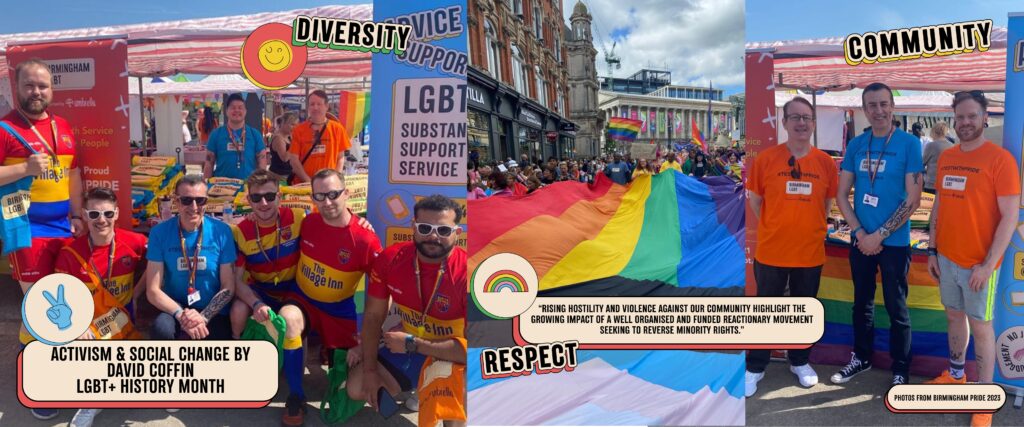It’s LGBT History Month 2025, with activism and social change as key themes. It is important to acknowledge the current challenges faced by LGBTQ+ individuals in the UK. Rising hostility and violence against our community highlight the growing impact of a well organised and funded reactionary movement seeking to reverse minority rights.
It’s worth reflecting on our shared journey over the last half century and seeking inspiration on how we face the future together. In 1967 The Sexual Offences Act legalised homosexual acts in England and Wales, on the condition that they were consensual, in private and between two men who were 21 years old, or older. While a landmark moment, we were a long way from equality. Before this act LGBTQ+ people were barely visible, and rarely positively, in UK social, civic and cultural life, and we know from oral testimony and cultural artefacts that, blackmail was common, with many people living secret, underground and risky lives, with the ever-present threat of ‘outing’ leading to social ostracisation, job loss, violence and prison.
Post 1967 two things changed immediately, gay men were less likely to go to prison, and LGBTQ+ people could openly organise for change! Sadly, for most people, social ostracisation, job loss and violence were still commonplace, and the gradual integration and acceptance of LGBTQ+ people in society took decades to achieve, through sustained activism and, often small but brave acts of solidarity and defiance in the face of a hostile culture by millions of ordinary people. I remember in the 1980s and 1990s, effectively being a second-class citizen, where people could bully and harass with impunity in workplaces, educational and social spaces, with many of my friends estranged from family.
So how does this history help us today? LGBTQ+ people were an insurgent counterculture, fighting against the status quo, and faced with an at best indifferent and at worst oppressive state and political culture. The rights and protections we have today were not given to us by benevolent governments, they were fought for tooth and nail by people like you.
In the 1960s and 1970s early pioneers such as Campaign for Homosexual Equality and Gay Liberation Front, used a variety of tactics in very hostile environments to demand and make change, such as letter writing campaigns, zines, protests, marches and rallies. Pride itself was born in this period and grew bigger and stronger each year as more people chose to live freely and openly. By the 1980s, born out of the grief and trauma of the AIDS crisis, and revulsion and anger at the UK governments response, a second wave of activism was born. It mobilised a much larger section of society, with groups such as OutRage! staging regular non-violent direct-action protests. People were far more radicalised and often willing to be arrested, and this direct and media savvy activism drew allies from across society.
The following decades have seen the proportion of the British public who say they approve of same-sex partnerships increase massively, alongside legislative shifts meaning better protection in law for those in our community, including the equality act, civil partnerships and same sex marriage.
So, thinking of Activism and Social Change today, we have a lot worth protecting and still things we need to fight to change, but the last half a century tells us it’s possible to do both at the same time and in much less favourable environments. For me, three things always emerge from research into LGBT history and our struggle for equality.
- Be Visible: Where safe, visibility is crucial. Do not allow erasure.
- Be Organised: Small, motivated groups with clear objectives can effect change.
- Stand in Solidarity: Support fellow LGBTQ+ individuals and other marginalised communities targeted by demagogues and hate merchants. Unified efforts amplify our collective power.
Finally – Let your fear be your fuel not your oppressor. Have an engaged and proud LGBT History Month
David Coffin is a trustee of Birmingham LGBT and worked on the Gay Birmingham Remembered oral history project, which in 2008 collected and archived the life stories of over 50 LGBTQ+ people.


